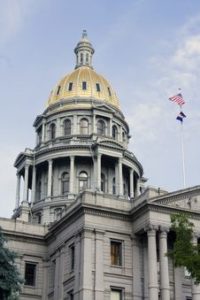by Alana Rosen
As we quickly approach the New Year and the 2023 legislative session, the Colorado Capitol will soon be filled with legislators, partisan legislative staff, nonpartisan legislative staff, executive agency officials, lobbyists, and the public. With so many individuals in the building, you may be asking yourself, “What is the difference between partisan and nonpartisan legislative staff if they all serve the Colorado General Assembly?”
Partisan legislative staff work for or strongly support one side, party, or legislator. In Colorado, the House of Representatives and the Senate each have a Democratic and Republican caucus staff made up of partisan legislative aides, interns, and staff. Partisan staff work to advance  the policy agenda of a legislator or that person’s caucus, as well as assist with requests from constituents. Partisan staff are more likely to discuss political and personal beliefs in the workplace.
the policy agenda of a legislator or that person’s caucus, as well as assist with requests from constituents. Partisan staff are more likely to discuss political and personal beliefs in the workplace.
Nonpartisan legislative staff, on the other hand, aim to serve all legislators impartially— regardless of party—ensuring their work is objective, balanced, and accessible. To fulfill this function properly, nonpartisan staff must provide the highest level of service to all members, under all circumstances, so the General Assembly feels confident in their impartiality. When nonpartisan staff participate in partisan political activities, public confidence in the legislative process can be undermined by creating a perception that nonpartisan staff may not provide the unbiased support necessary to enable the General Assembly to make informed decisions that best serve the public interest.
Nonpartisan legislative staff have a compelling interest to protect both the actual and perceived integrity of the legislative process by placing narrowly tailored restrictions on employees’ political activities. For this reason, nonpartisan staff are prohibited from fundraising for a partisan candidate, making political contributions, actively participating in the campaign of a partisan candidate, actively participating in a political party or organization, or running for political office. Additionally, nonpartisan staff do not discuss politics or personal beliefs with legislators, partisan legislative staff, executive agency officials, lobbyists, or the public.
During the interview process, prospective staff are often asked extensive questions regarding their ability to be nonpartisan and whether they have any reservations about being nonpartisan. It is a code of conduct that nonpartisan staff adopt in order to serve the legislature fairly and impartially.
You may now be wondering, “Who are the nonpartisan staff so I can avoid engaging them in political discussions?” In addition to your nonpartisan Senate Services staff and staff of the House of Representative, there are four nonpartisan legislative agencies created in state law that serve the Colorado General Assembly with oversight from a legislative committee : the Office of Legislative Legal Services (OLLS), Legislative Council Staff (LCS), Joint Budget Committee Staff (JBC), and the Office of the State Auditor (OSA).[1]
The OLLS is the nonpartisan in-house counsel for the General Assembly. Among its many tasks, the OLLS writes laws, produces statutes, reviews administrative rules, comments on initiated measures, and serves as a resource of legislative information for the public.
The LCS is the permanent research staff of the General Assembly, providing public policy research at the request of the members. The LCS provides support to legislative committees, responds to requests for research and constituent services, prepares fiscal notes, provides economic and revenue forecasts, and performs other centralized legislative support services.
The JBC is the General Assembly’s permanent fiscal and budget review agency. The JBC writes the annual appropriations bill, also known as the Long Bill, for the operations of state government. The JBC is charged with analyzing the management, operations, programs, and fiscal needs of the departments of state government and makes recommendations to the members of the General Assembly as they build the state’s budget.
The OSA seeks to hold state government agencies accountable through performance, financial, and information technology audits of all state departments, colleges, and universities. Audits provide solution-based recommendations that focus on reducing costs, increasing efficiency, promoting the achievement of legislative intent, improving effectiveness of programs and the quality of services, ensuring transparency in government, and ensuring the accuracy and integrity of financial information to hold government agencies accountable for the use of public resources.
With so many new members in the General Assembly this year, a clearer understanding of the differences between the roles of partisan and nonpartisan legislative staff is helpful as we enter the 2023 legislative session. If you’re a new legislator and have questions, please feel free to contact the OLLS at 303-866-2045 or olls.ga@coleg.gov.
[1] See article 3 of title 2, Colorado Revised Statutes.
